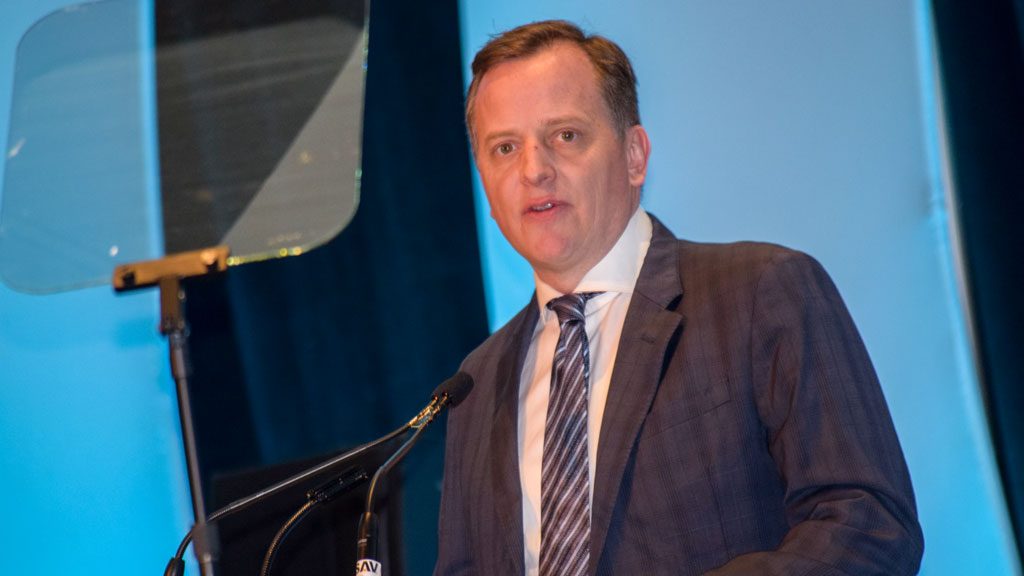Ontario’s Transportation Minister Jeff Yurek laid out a long list of major highway projects the government is set to roll out at the recent Ontario Road Builders’ Association (ORBA) convention but stopped short of promising they would proceed according to previously announced timetables.
Instead, Yurek told the roadbuilders audience, with a deficit of $15 billion largely inherited from the previous Liberal government, transportation projects are being reassessed along with other major builds as Finance Minister Vic Fedeli prepares to release the province’s next budget.
“As business people, you understand that if the deficit were to keep growing, it would put many things at risk, like hospitals, schools and even our transportation network,” Yurek said during a Feb. 5 session at the conference held in Toronto.
“We are currently reviewing all proposed projects and actions taken place to date to determine necessary steps, to make sure we are best positioned to provide quality and efficient transportation options to all Ontarians.”
In an interview after his presentation, Yurek declined to speculate on whether ORBA members would be disappointed or pleased when Fedeli unveils the transportation spending envelope in the budget.
“We are just coming to the close of the review, but at the end of the day when we roll out our plan that we are investing in roads and bridges and connecting communities and in addition adding to transportation infrastructure within the GTHA, it’s going to be an exciting time for everybody,” said Yurek.
In addition to the previously budgeted Highway 427 expansion in the Toronto area, Yurek also reiterated the government’s pledge, announced in its November economic statement, to get the GTA West Corridor back on track, reversing the previous government’s cancellation of the project.
The economic statement announced that environmental assessment of the project would resume.
“We restarted it, the previous government cancelled the process, and we are kickstarting the environmental assessment. Hopefully we can get moving on that to deal with the gridlock that surrounds the area,” said Yurek.
The highway, dubbed 413, would run from Vaughan through Caledon and Brampton into Halton Region.
Other projects Yurek identified as priorities include four lanes on Highway 17 west of Arnprior, Highway 3 between Leamington and Windsor, the 400 expansion, twinning of Highway 69 between Sudbury and Parry Sound and twinning of Highway 17 between Kenora and the Manitoba border.
In addition to Yurek’s morning address, the Ministry of Transportation (MTO) also had three staffers making a joint presentation during an ORBA luncheon session.
Among other topics, Tony Tuinstra, director of the MTO’s Contract Management and Operations Branch, addressed asphalt quality and problems with the implementation of the MTO’s new Web-Based Contract Management Service (WBCMS).
We are listening to the concerns of users and we are striving to make improvements
— Tony Tuinstra
Ministry of Transportation
The WBCMS is intended to capture, transmit and store project data and provide reliable information to users throughout the execution of contracts.
Tuinstra acknowledged there have been a few glitches in the new system.
“We have had our challenges and we appreciate the support and patience of the industry as we implement the change,” he said.
“We are listening to the concerns of users and we are striving to make improvements to enhance the system and are adapting to meet the needs of the users.
“It has been a learning experience for all.”
Yurek commented, “Hopefully we’ll make the necessary changes working with our partners throughout the province to ensure that from the time they announce the contract to the time the last cheque is paid that it’s as seamless as possible and as efficient as possible.”
As for asphalt quality, which was identified as a problem by the province’s auditor general in 2016, Tuinstra said subsequent research, product trials and collaboration with such stakeholders as ORBA seem to be paying off.
Reforms in 2017 and 2018 have included enhanced testing of asphalt cement, increased compaction requirements and suspension of the use of reclaimed asphalt pavement.
“It is worth highlighting that of the pavements constructed using the new requirements, there has not been any premature cracking identified, and as a result we are anticipating a 10-per-cent increase in pavement life based on compaction and asphalt cement content,” said Tuinstra.











Recent Comments
comments for this post are closed